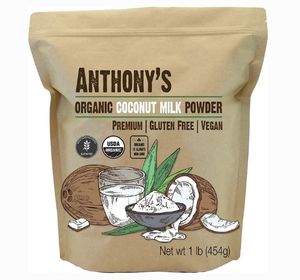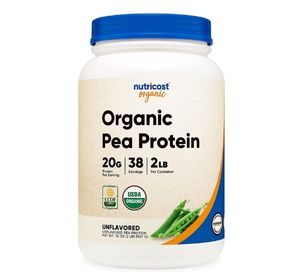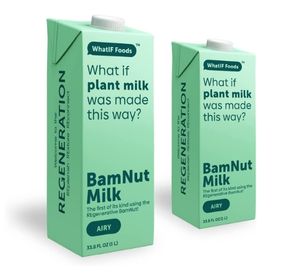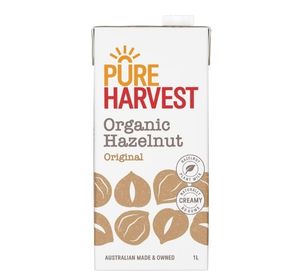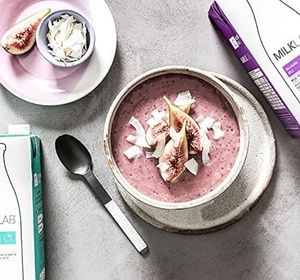Vegan Milk
Going dairy-free is one of the most natural changes to diet because drinking milk past infancy is not what nature intended. This is why over two-thirds of the global population is said to be lactose intolerant. With many people going vegan, offering dairy-free milk drinks has also vastly improved.
Gone are those days when we felt strange asking for a plant-based milk alternative in our tea, coffee or hot chocolate where only cow's milk was available. The coffee shops, cafes and takeaway industries are no strangers to vegan milk, and it has become more widely available. As more and more people are awakening to the cruelty of the dairy industry, the demand for alternative non-dairy milk is increasing rapidly.
For many years, soy milk and rice was the only non-dairy milk option found in cafes, grocery stores or supermarkets. But now, many other plant-based alternatives are ample, including soya milk, rice milk, pea milk, oat milk, hemp milk, coconut milk and other nut milks.
Many consumers, more than ever, add plant-based milk to their beverages due to their nutritional value to suit their plant-based diet or some as an alternative for lactose intolerance. Some seek plant milks to reduce their dairy intake, and many as they prefer the taste of vegan milks.
The dairy industry is much worse for the planet than plant-based milk. Plant-based milks take much less water and land and produce much less carbon dioxide than dairy milks. Going dairy-free is a smart move not just for ethical and environmental reasons but also for health reasons such as the risk of heart disease. This is because, unlike dairy milk, most milk alternatives are low in saturated fat, yet dairy-free milk contains plenty of calcium and protein. Vegan milks may reduce the risk of breast cancer.
Vegan Milks Are Growing In Popularity
Even though plant milks have been consumed for centuries in many cultures, they were only so popular in the past few decades.
Vegan milk is blended nuts, beans, seeds, and grains with filtered water. If you plan to go vegan, soy, oat and almond milk can be the best selections for a cow's milk-style experience in your first days. They are thick and have a relatively neutral flavor (flavour). Vegan milk consistently tastes better than cows' milk.
Many vegan milk brands fortify milk with added calcium, vitamin D and B vitamins, and omega-3 fatty acids to support vegans in achieving diets that meet the recommended intakes. Oat and pea milks have higher calories, whereas unsweetened varieties of almond and cashew milks are low in calories.
Discover all vegan milks you may enjoy that could inspire you to try other dairy-free foods.
Coconut Milk
Coconut milk is relatively high in saturated fat content than other plant milks and is rich with a creamy texture. These saturated fats are short and medium-chain triglycerides regarded as healthy fats. It is suitable for smoothies, sweet treats, puddings and desserts, especially those with tropical fruits. It is also used in cooking and baking. But remember, it will give a coconutty taste; therefore, it can only be ideal for some savoury dishes. In South Asia, coconut milk is used to make pancakes, rice pudding and sago pudding. Full-fat coconut milk is a great dairy alternative when making ice cream.
It is an essential ingredient in Thai, Sri Lankan, Malaysian and South Indian curries and is also used in making creamy soups and creamy sauces.
Coconut milk is widely available and comes in various brands and can be found in major supermarkets, health food stores, some restaurants, cafes and coffee shops. However, anyone with a fresh coconut can easily make it. It is made by grating fresh coconut flesh and mixing it with water, traditionally by hand. Rich coconut cream is obtained with little or no water added, while more water gives thinner milk.
Soy Milk
Soya is naturally more protein than other vegan milks, contains essential fats, fibre, vitamins and minerals, and can help lower cholesterol. Soy milk has a mild flavor and is an outstanding universal drink and one of the best for tea, coffee and cereal. It has the highest protein content of all plant milks, with the same protein content of 8 grams of protein as cow's milk. It is creamy in texture and ideal for tea and coffee.
Soy milks can also be found in various brands and flavours and can also be enjoyed in smoothies, desserts and cooking apart from hot drinks.
Oat milk
Sweet, delicious and mild flavour, Oat milk is made by soaking the hulled oats in water. Oat milk is nice and creamy but more caloric than many other plant-based milks. This extra creamy oat milk works well on cereal and smoothies and gets a definite thumbs up for tea and coffee.
It is considerably low in fat and can lower blood cholesterol levels. It has the second-highest protein content, and a serving will also provide 10% of the recommended daily amount of iron for vegans. However, oat milk should be avoided by anyone who's gluten intolerant. Studies show that regular consumption of oat milk can have a favourable impact on gastrointestinal concerns.
It is also suitable for cooking and heats well without curdling. It is widely available and easily found in supermarkets and cafes.
Rice Milk
Rice milk is popular due to its low-fat nature and sweet taste. In taste tests, it has been shown that rice milk is more popular than soy milk and is the closest in taste to cow's milk. However, this is just an opinion and always relies on personal preference. Rice milk is a good option for desserts, cereal and smoothies. Due to its thin consistency, most people don't like it in tea or coffee, and it would also need an added thickening agent when used in cooking and baking.
Hemp milk
Hemp milk is made from hemp seeds, the seeds of hemp plant, a relative of cannabis but with NO psychoactive chemicals. Hemp seeds are one of the best vegan protein sources in the world, containing all essential amino acids and omega-6 and omega-3 fatty acids.
It is thick and creamy but has a relatively neutral taste. It also has a sweet, nutty flavour that works well in tea, coffee, smoothies and cereal. It is most suited to savoury dishes, and many people use it instead of soy milk.
Pea Milk
Like other vegan milks pea milk also has a lower water and carbon footprint than cow's milk. It is smooth and creamy and is also high in protein and calcium.
Pea milk is produced mainly by blending yellow peas with water. It involves the process of milling the peas into flour and then processing the flour by splitting the pea protein from the fibre and starch. The pea protein gets blended with water and other ingredients such as sunflower oil, sea salt and vitamin B12.
Almond Milk
Almond milk hit the vegan milk market, adding a different choice for people who were exhausted with soy and rice milk. Cafes and restaurants embraced almond milk for its high demand. Almond milk stays the most widely used plant milk apart from soy milk but has less protein than soy milk.
Almond milk is the most versatile nut milk and is rich in vitamin E. It is low in fat, has fewer calories and can be an ideal choice for people on a low-carb diet. It has a mild nutty flavor and comes in various flavours.
Cashew Milk
Cashew milk is similar to almond milk but is creamy, nutty, and great for smoothies. It has mixed reviews for its taste in tea and coffee, so it's best to try it yourself and see if you like it. It is suitable for cooking and baking in both sweet and savoury recipes. Cashew milk is low in calories and fat but contains much less protein than soy milk.
Hazelnut Milk
Hazelnut milk is deliciously nutty and heats and foams better than almond or soy milk. Hazelnut milk contains several B vitamins and vitamin E. The taste is also more potent than almond milk, which goes well with hot chocolate and sweet desserts. It's nice in cereal and smoothies, tea and coffee.
Hazelnut milk is one of the less common of the standard plant milks and is sold by several brands, but not all shops still stock them.
Macadamia Milk
Macadamia milk arrived on the market much more recently than the other nut milks mentioned here and is also not commonly accessible. It is low in calories but also very low in both protein and carbohydrates. It tastes terrific and is mainly suitable for desserts and coffee.
Below, we have put down a guide to the best vegan milk brands on the market to help you choose non-dairy milks for your favourite plant-based beverage. You should always read the nutrition labels and seek professional advice for allergies or concerns.

















